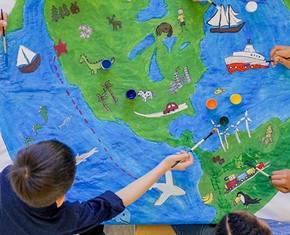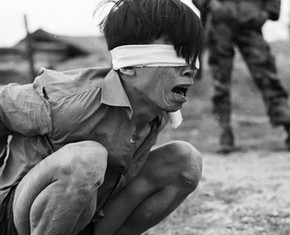The views expressed in our content reflect individual perspectives and do not represent the authoritative views of the Baha'i Faith.
Be thou a summoner to love, and be thou kind to all the human race. Love thou the children of men and share in their sorrows. – Abdu’l-Baha, Selectizons from the Writings of Abdu’l-Baha, p. 26.
These passages—the third and fourth lines of profound spiritual advice in Abdu’l-Baha’s letter to a woman who asked him for a life-guiding rule—had a particularly strong impact on my six-year-old son. He wanted to know the rules of life, and having recently entered 1st Grade in elementary school, we looked through the Baha’i teachings to find rules he could understand and practice.
You remember 1st Grade, right?
Think back: you’ve graduated from kindergarten, where you mostly played with blocks and ate snacks and took naps and had fun. Most kindergartens have wonderful, sweet teachers who love children, so chances are you had a good experience there when you were five. Most five-year-olds still have the innocence and gentle demeanor of early childhood, so you probably had few conflicts or difficulties, and if you did they usually didn’t last very long.
In 1st Grade, though, things begin to change. My son started studying and learning. In 1st Grade, many of the kids still retain their five-year-old sweetness, but a few don’t. Conflicts increase. Personalities sometimes take on an edge they didn’t have before. In 1st Grade, we often face our first experiences with contention and struggle in dealing with others. So my son wanted to know: “What should I do when someone threatens me, or hits me, or is mean to me? What about bullies?” Like most children, he had the age-old childhood questions: “How do I make friends, and what do I do about enemies?”
The time had come, I knew, to reinforce the fundamental rule of kindness:
…ye must show forth tenderness and love to every human being, even to your enemies, and welcome them all with unalloyed friendship, good cheer, and loving-kindness. – Abdu’l-Baha, Selections from the Writings of Abdu’l-Baha, p. 21.
Tenderness and loving-kindness are basic principles of God’s heavenly Kingdom. Ye should most carefully bear this matter in mind. – Abdu’l-Baha, Selections from the Writings of Abdu’l-Baha, p. 159.
We try to teach the virtues of love and kindness to our children—but it isn’t always easy to do. Even though children are born as gentle, affectionate, naturally loving beings, some of them eventually become unkind, thoughtless bullies. Kids, I learned early in my parenting career, are little mirrors. Whatever you do, they will mimic. Almost always, bullies develop because of the parents. When mothers and fathers manifest love and kindness toward their children, the children naturally want to be that way, too. But when parents mistreat, ignore or abuse their children, it creates anger, rebellion and the desire to strike out and hurt others. As the old saying goes, hurt people hurt people.
So how, I wondered, do I teach my children the qualities of gentle loving kindness? Beyond the obvious—parenting with love and kindness—I found a clue in the Baha’i writings:
Briefly, it is not only their fellow human beings that the beloved of God must treat with mercy and compassion, rather must they show forth the utmost loving-kindness to every living creature. For in all physical respects, and where the animal spirit is concerned, the selfsame feelings are shared by animal and man. Man hath not grasped this truth, however, and he believeth that physical sensations are confined to human beings, wherefore is he unjust to the animals, and cruel. – Ibid., p. 158.
Animals! That’s it, I thought! In my experience, growing up on a farm and always having animals to take care of, the tender hearts of children can relate to the tender feelings of most domesticated animals. Raising a puppy or a kitten, children can be taught to treat animals with compassion, gentleness and kindness—and that prepares them for kind, loving interaction with people:
Train your children from their earliest days to be infinitely tender and loving to animals. If an animal be sick, let the children try to heal it, if it be hungry, let them feed it, if thirsty, let them quench its thirst, if weary, let them see that it rests. – Ibid., p. 159.
Empathy—the ability to feel how others feel—comes directly from this sort of kindness training. When Abdu’l-Baha counsels us to “Love thou the children of men and share in their sorrows,” he’s really outlining the basic human rule of empathy; teaching us the Golden Rule; and asking us to treat others as God treats us:
O God, my God! Aid Thou Thy trusted servants to have loving and tender hearts. Help them to spread, amongst all the nations of the earth, the light of guidance that cometh from the Company on high. Verily Thou art the Strong, the Powerful, the Mighty, the All-Subduing, the Ever-Giving. Verily Thou art the Generous, the Gentle, the Tender, the Most Bountiful. – Ibid., p. 21.
So, as soon as my wife and I could, we got our sons a puppy. A golden retriever, in honor of the Golden Rule, that playful and sweet pup taught them a great deal about empathy and kindness. Raising and training that dog gave our boys the opportunity to develop loving and tender hearts.
Next: Three Ways to Personally Foster Peace
You May Also Like
Comments

















about the time you mentioned....
it can be a real shock to the sensitive.
Maybe animals should be used more
in school settings to help prevent those unpleasant social patterns from developing. Could the budding
bullies and the sweet types find common ground in focussing their
attention on the creatures? Maybe
respect for vulnerability and the
"underdog", if I may use that term,
would transfer into the human realm!